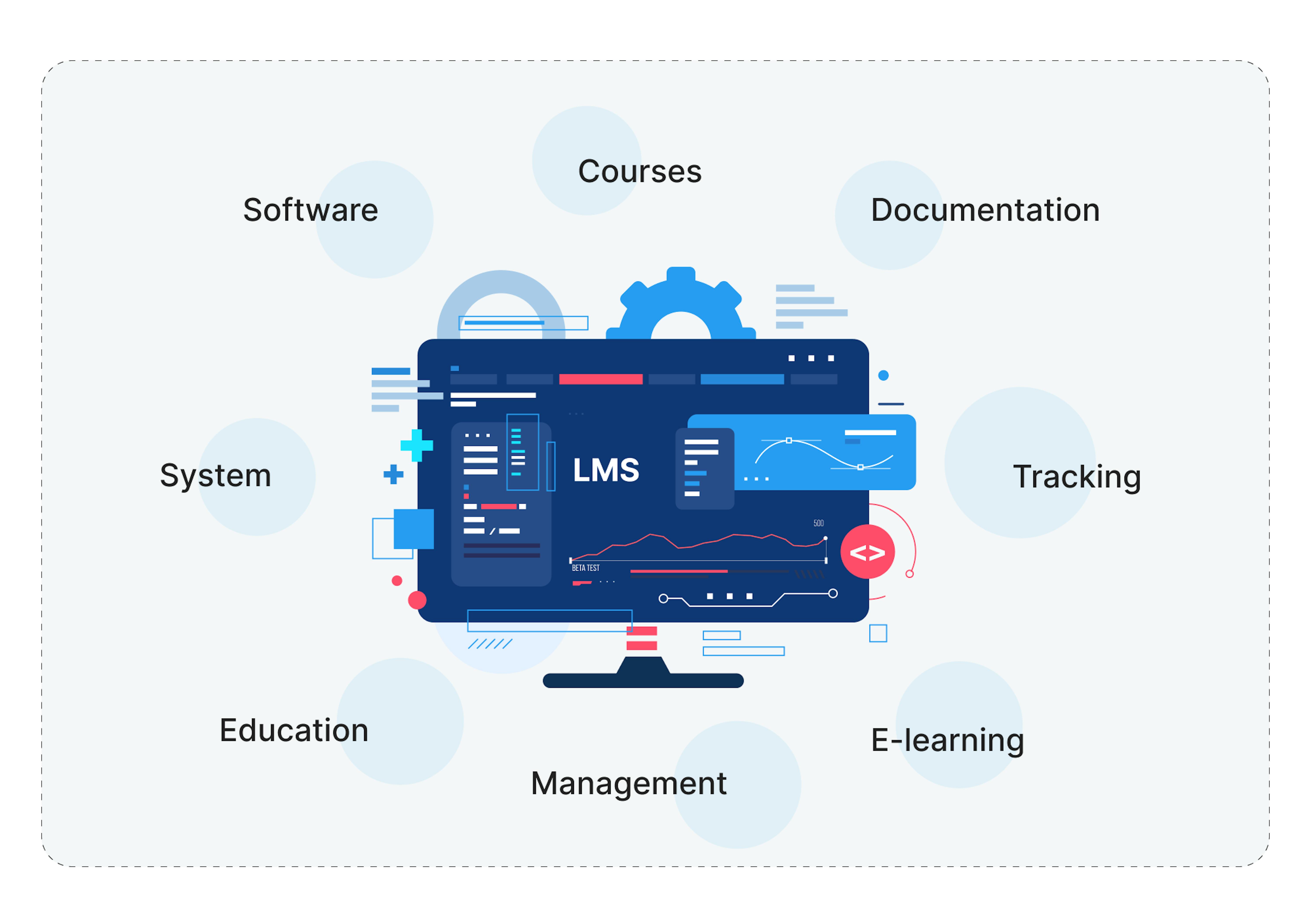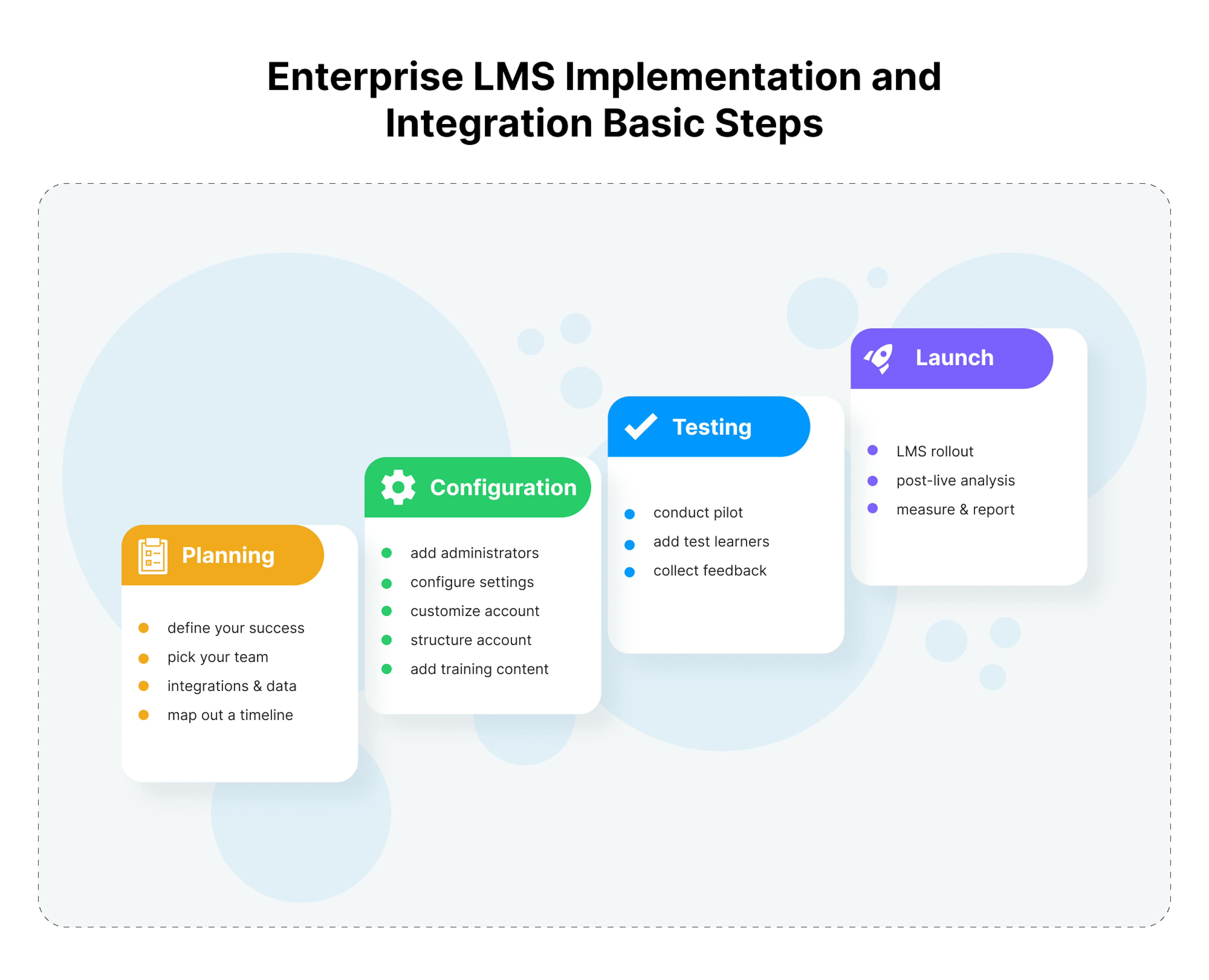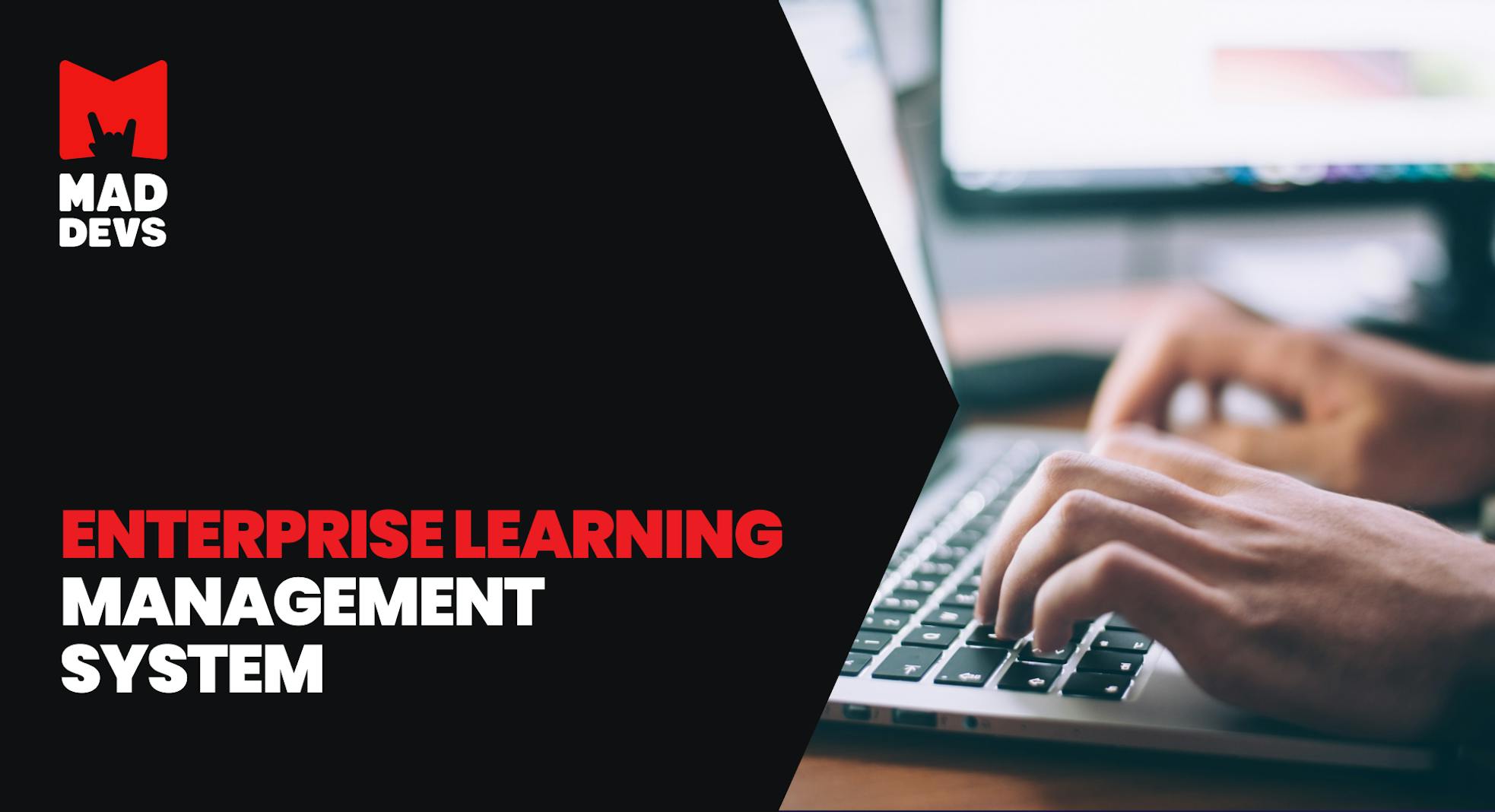Analyze with AI
Get AI-powered insights from this Mad Devs article:
Gone are the days when employee training confined learners to dull lectures in conference halls within boring four walls. Thanks to the rapid evolution of learning technology, traditional training has transformed into the corporate learning management system we have today.
Enterprise learning management systems play a crucial role in modern corporate training by providing convenient access to learning materials, tracking progress, and promoting continuous learning for improved employee skills, productivity, and time efficiency when onboarding new employees.
While the market is saturated with numerous learning management systems claiming efficiency and outstanding performance, to make the right choice, it is important to understand key features, use cases of ready-made software or develop custom, and know the best players. Mad Devs will cover all these topics in this article, as well as share our experience with one of the popular tools.
What is an enterprise learning management system?
Learning management systems (LMS) and eLearning software have emerged as the dominant method of delivering learning experiences across various sectors.
According to Global Market Insights research, the eLearning industry is projected to reach a market value of $1 trillion by 2028.
While eLearning and LMS are commonly associated with academic and educational contexts, the business industry is one of the most promising and rapidly growing areas of their development. As per FinancesOnline, learning management systems are crucial in fostering enterprise development and growth. Recent findings indicate that over 72% of organizations utilize learning management systems innovations to gain a competitive edge. This leads to the rising popularity of enterprise learning systems.
An enterprise learning management system (LMS) is a platform for managing and delivering corporate training to employees, enabling them to enhance their professional knowledge and skills, uphold certifications, and adhere to government and state regulations. Additionally, the system educates external stakeholders, such as partners, sales representatives, and customers, about the enterprise's products and services.

What are the benefits of using these LMS platforms?
Using LMS platforms offers many advantages for organizations, learners, and administrators alike. Let’s elaborate on some of them:
- Centralized learning hub
LMS provides a centralized and easily accessible repository for all training and educational materials. Participants can access courses, resources, and assessments from a single platform, promoting organization and efficiency. - Flexibility and accessibility
Usually, LMS supports various learning formats, including self-paced eLearning, instructor-led training, webinars, and virtual classrooms. Learners can access content from anywhere with an internet connection, allowing flexible and remote learning opportunities. - Personalized learning paths
LMS platforms enable personalized learning paths based on learners' roles, skills, and knowledge levels. Administrators can customize course offerings, recommend relevant content, and track individual progress, ensuring learners receive tailored and appropriate training. - Efficient training management
LMS streamlines the process of creating, managing, and delivering training courses. Automated features such as enrollment, notifications, and progress tracking reduce administrative workload and save time. - Enhanced learner engagement
Gamification elements, interactive content, and social learning features boost learner engagement and motivation. It leads to increased knowledge retention and better learning outcomes. - Compliance tracking and reporting
These platforms excel in tracking compliance training and certifications. Administrators can generate detailed reports on learners' progress, completion rates, and assessment results, aiding in regulatory compliance and performance analysis. - Cost savings
Implementing an enterprise LMS can lead to cost savings by reducing the need for traditional in-person training sessions, travel expenses, and printing costs for learning materials. Additionally, scalable pricing models allow organizations to pay for what they use. - Continuous learning and development
They foster a culture of continuous learning within organizations. Learners can access a wide range of courses and resources to develop new skills, stay up-to-date with industry trends, and advance their careers. - Data-driven decision-making
LMS platforms offer valuable insights through reporting and analytics, enabling administrators to make data-driven decisions to optimize training programs and improve organizational performance. - Integration capabilities
They often integrate with other systems, such as HR software, talent management platforms, and webinar tools, creating a seamless learning ecosystem and enhancing the overall learning experience. - Standardization of training
LMS platforms ensure consistent and standardized training across the organization, minimizing variations in content and delivery methods. - Facilitated remote work
LMS allows organizations to seamlessly train and educate employees regardless of location, ensuring they have access to essential materials and skills needed to excel in their roles. Employees can engage in self-paced learning, participate in virtual training sessions, and stay up-to-date with company policies and industry developments, fostering productivity and success in a distributed workforce.
All of the above is about modernizing and improving the learning and development processes. And, of course, it should be based on specific features of LMS.
Key features of LMS
Critical features in enterprise LMS collectively empower large organizations to effectively manage their learning and development initiatives, enhance employee skills, ensure compliance, and encourage a culture of continuous learning within the enterprise. Here are them:
| LMS PLATFORMS FEATURES | |
|---|---|
| Course management | To allow administrators to create, organize, and deliver various courses and learning content. It offers flexibility in structuring courses, incorporating multimedia elements, and setting up assessments to cater to diverse learning needs. |
| User management | To provide robust user management capabilities. Administrators can create and manage user accounts, assign roles, and group learners based on departments or other criteria. It streamlines the process of enrolling learners into relevant courses and ensures personalized learning paths. |
| Reporting and analytics | Comprehensive reporting and analytics tools offer valuable insights into learner progress, course completion rates, and overall training effectiveness. Administrators can identify areas for improvement, track learner engagement, and make data-driven decisions to optimize training programs. |
| Compliance and certification tracking | To help organizations stay compliant with industry regulations, manage certification deadlines, and ensure that employees maintain necessary qualifications. |
| Integration capabilities | It is about integration with other HR systems, talent management platforms, and third-party applications. This integration allows data synchronization and provides a unified learning ecosystem, enhancing user experience and reducing administrative overhead. |
| Security and data privacy | Security is paramount for an enterprise LMS. Robust data security measures, such as encryption, access controls, and regular system audits, protect sensitive learner information and ensure compliance with data protection regulations. |
Things to keep in mind when choosing an enterprise LMS
First of all, take the most important areas and ask these questions:
Data security and privacy
- Does the LMS comply with industry data protection regulations (e.g., GDPR, CCPA)?
- How does the LMS safeguard sensitive learner and organizational data?
- Are there measures in place to prevent unauthorized access and data breaches?
Ensure that the LMS follows industry best practices for data security and privacy. Compliance with data protection regulations is essential, mainly if the LMS contains sensitive employee or customer data.
Technical compatibility and integration
- Does the LMS integrate with existing systems used in the organization?
- Is the LMS compatible with different devices and operating systems (e.g., mobile, desktop)?
- What technical requirements and infrastructure are needed for seamless LMS implementation?
Check the LMS's ability to integrate with your existing systems, such as HRIS, CRM, or talent management platforms. Seamless integration streamlines data exchange and enhances the overall training experience. Also, as mobile learning becomes more prevalent, consider whether the system supports mobile devices, enabling learners to access training content on the go.
User adoption and engagement
- Is the LMS user-friendly and intuitive for both learners and administrators?
- Does the LMS offer features like gamification, social learning, or multimedia content to enhance learner engagement?
- What strategies are available to encourage user adoption and foster a positive learning culture?
An intuitive and user-friendly interface is essential for both learners and administrators. A clean and easy-to-navigate interface enhances the overall learning experience and reduces the learning curve for LMS administrators. The system should support various content formats, such as videos, documents, presentations, and quizzes.
Moreover, effective reporting and analytics are crucial. It should provide detailed insights into learner engagement, completion rates, and other performance metrics for measuring the success of your training programs.
Scalability and flexibility
- Can the LMS accommodate the organization's current and future training needs?
- Is the LMS capable of handling a growing number of users and expanding content libraries?
- How easily can the LMS adapt to training requirements or organizational structure changes?
Ensure the LMS can scale to accommodate your organization's current and future training requirements. It should be flexible enough to adapt to changing needs and evolving technology. Evaluate the total cost of ownership, including licensing fees, implementation costs, and ongoing maintenance. Calculate the potential ROI by assessing the long-term benefits the LMS can bring to your organization.
Customer support and training
- What level of customer support does the LMS vendor offer, and how responsive is their support team?
- What resources and training are available to help LMS administrators effectively manage the platform?
- How does the vendor handle software updates and improvements?
Research the LMS vendor's reputation, customer support offerings, and response times. A reliable vendor will provide ongoing assistance and updates to ensure smooth LMS operation. Seek feedback from other organizations that have used the LMS you are considering. User reviews and references can offer valuable insights into the LMS's performance, strengths, and weaknesses.
When to choose custom enterprise LMS
Creating a custom LMS requires significant investments, leading many enterprises to question its efficiency. It can be tailored to fit your specific workflows, processes, design preferences, and more specific reasons. Let’s list them:
Unlike ready-made platforms, custom LMS solutions can offer first-class security measures, safeguarding sensitive training data and protecting the organization from data breaches and cyber threats.
It can be designed to meet specific industry regulations, ensuring organizations stay compliant and avoid potential legal issues.
Custom LMS solutions can implement advanced learning scenarios catering to multiple departments and diverse user segments, such as employees, customers, and partners, ensuring a more comprehensive and tailored training experience.
It allows enterprises to nurture a sense of integrity by offering a branded, user-focused training system that aligns with their corporate identity and values.
Enterprises can provide various learning styles within a single interface, accommodating blended training for workers and micro-training for partners, catering to diverse learning preferences.
If any of these reasons resonate with your enterprise, it may be the right time to invest in creating a custom LMS that offers security and functionality and aligns perfectly with your expectations and requirements. Mad Devs can assist you. Contact our specialists for our custom software development service.
It's essential to note that developing a custom LMS requires careful planning, dedicated resources, and technical expertise. If you are considering this route, you should conduct a thorough needs assessment and engage experienced software development teams to deliver a tailored and effective learning management system successfully.
But let's get back to the point: How do we integrate ready-made software into our processes if we choose ready-made software?
Implementation and integration of an enterprise LMS
The process of implementing and integrating an enterprise LMS involves several key steps. Depending on the tool, there may be nuances in implementation, but they are all covered in 4 basic steps:

By following these steps, organizations can successfully implement and integrate an enterprise LMS, providing an efficient and effective learning solution for their workforce.
It’s finally time to meet the best players in the LMS market. One of them can perfectly fit your company's requirements and goals.
Top enterprise LMS for your needs

Absorb LMS provides organizations with a unified platform that covers various training needs, including compliance, sales, partner and customer training, employee onboarding and development, and commercial training sales.
It has a feature that integrates course catalogs, eLearning content, and online collaboration tools, directly into native organizational applications like CRM systems.
With Absorb, organizations can create separate training portals to deliver tailored learning experiences to different groups, all while having the flexibility to customize the look, feel, and functionality of these portals according to specific preferences.
Key features:
- Customizable dashboards for personalizing themes, dashboard widgets, and training data.
- Enhanced engagement and retention through features like social learning, certificates or badges, webinars, and other eLearning tools.
- Configurable and customizable analytics and reports.
- Offline and online mobile LMS app extension.
Pricing: Upon request
Free trial: Yes

iSpring LMS offers a comprehensive solution, seamlessly managing employee training via both online and blended learning approaches. The system caters to various training needs, including new employee onboarding, product training, and fulfilling recertification and compliance obligations.
The platform allows unlimited administrators to allocate users to designated roles. Customization options include incorporating the company logo or choosing a color scheme to align with the company brand.
Key features:
- Automation of repetitive tasks through parameter setting.
- Dashboard for easy overview of learner progress.
- Access to 24/7 eLearning via iSpring Learn mobile app.
- Creation of quizzes, videos, games, and micro-learning content.
- LIVE Video conferencing / Webinars.
Pricing: 100 users at $2.87 per user/month
Free trial: Yes

Talent LMS serves as a streamlined and adaptable enterprise LMS, perfectly suited for both in-person and remote training. Operating as an uncomplicated platform, it enables organizations to swiftly generate eLearning courses and training schemes, lending themselves to personalization, gamification, and compatibility across diverse devices. The platform also facilitates the creation of surveys, quizzes, tests, and assignments for learning assessments, along with the capacity to craft customized certificates recognizing individual or team achievements. It supports more than 30 languages.
Key features:
- Drag-and-drop functionality for adding media and files, including cmi5, SCORM, and xAPI.
- Live in-person or online training sessions
- Platform customization options include a training homepage, company brand colors and logo, and user-specific time zones and languages.
- Detailed learning paths, achievement tracking, and completion recognition.
Pricing: $69 per month (up to 40 users)
Free trial: Yes

Docebo stands as an enterprise LMS driven by AI, providing a comprehensive suite for learning and development. It boasts availability in over 40 languages and enhances customization and adaptability with over 400 integration solutions, encompassing platforms like Asana, Google Drive, Salesforce, Shopify, and Zendesk. Additionally, it offers a content repository containing readily shareable training materials across diverse subjects such as time management, leadership, and advertising. With Shape, an AI-based tool, users can craft their training content.
Key features:
- AICC/SCORM compliant.
- Asynchronous learning.
- Certification management.
- Classroom management.
- Corporate business conferencing.
- Mobile learning, social learning.
- Synchronous learning testing assessments.
Pricing: Upon request
Free trial: For 14 days

Cloud Academy serves as a corporate learning platform optimized for larger organizations. It focuses on talent retention and optimizing the return on investment in staffing. Additionally, it provides pre-built course content designed for imparting technical skills to your teams, encompassing subjects such as Google Cloud, DevOps, programming, and security. Its library offers extensive assessment choices, including quizzes and exams, elevating online training to an advanced level.
Key features:
- Certification and licensing.
- Creation of quizzes, tests, and assignments.
- Built-in course authoring.
- Asynchronous learning.
- Skill gap analysis.
Pricing: $65 per month (up to 15 users)
Free trial: Yes

EdApp is a mobile LMS that elevates corporate training for a more impactful eLearning experience. It stands out as a leading-edge microlearning solution in the market, offering advanced LMS features such as gamification, a cloud-based translation tool, custom push notifications, and other capabilities.
We used this system in Mad Devs, specifically in our HR department. The primary function of the LMS for us currently is onboarding training. New employees immerse themselves in our corporate culture by completing courses. These courses include information about workflows, stand-ups, working with Jira and Jira Assistant, as well as information about the company's agreements regarding work schedules and days off. We also have training materials from our Head of Delivery department and our corporate career coach available. Part of the information is presented through text and part through videos.
Why did we choose EdApp? Thanks to the following features that we utilize:
- Single Sign-On: Google Suite can be used for login.
- Course and test builder: Convenient and user-friendly.
- Built-in course and page templates for content delivery.
- Interactive component: Various formats like text, images, comparisons, and videos keep the learning engaging, preventing users from getting bored during the course.
- User creation via file upload.
- Video rewind protection and course information lock (no skipping allowed).
- Webinar capability.
- Mobile application availability.
- Course completion certificates are provided.
- Stars system (rewarding users by collecting stars that can be customized; for example, difficult questions could be worth more stars, and users can compete on a leaderboard).
- API Access, xAPI Support.
- Custom push notifications.
- Customer support is exceptional, responding to messages within 1 minute and providing assistance with any questions.
Pricing: $2.95–$5.95 per user/month
Free trial: Yes
To wrap up
Investing in the right enterprise LMS is a strategic decision that can drive organizational success, foster growth, and elevate the overall learning and development journey for every participant in the extended enterprise. As technology advances and training needs continue to evolve, harnessing the potential of an enterprise LMS becomes an integral part of building a competitive, adaptable, and future-ready organization.
Are you interested in integrating LMS into your company workflow? Get a free consultation from our experts to make the right choice among existing solutions or develop a custom LMS for your unique requirements.












